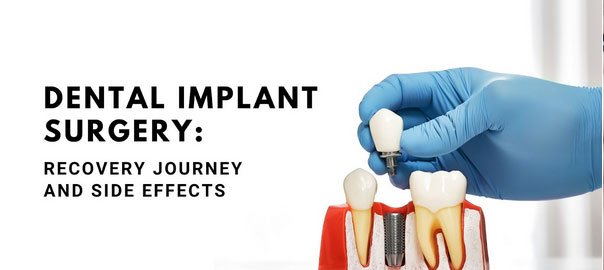
Dental Implant Surgery: Recovery Journey and Side Effects
Dental implant surgery has revolutionized the field of dentistry, providing individuals with a reliable solution for replacing missing teeth. While the procedure itself is relatively straightforward, understanding the recovery journey and potential side effects is crucial for a successful outcome.
In this blog, we will delve into the recovery process following dental implant surgery, explore common side effects, and provide valuable tips for a smooth recuperation.
Recovery Journey: What to Expect
The recovery period following dental implant surgery can vary from person to person, depending on factors such as the number of implants placed, the individual’s overall health, and the location of the implants. Generally, the recovery process can be divided into several phases:
Immediate Postoperative Period (Days 1-7): The initial days after surgery are critical for proper healing. You may experience some discomfort, swelling, and minor bleeding at the surgical site. Pain can usually be managed with prescribed pain medications, and cold compresses can help reduce swelling.
Healing and Osseointegration (Week 1-6): Over the next few weeks, the implants will begin to integrate with the jawbone in a process called osseointegration. During this period, you should maintain a soft diet to avoid putting excess pressure on the implant site. Good oral hygiene practices are essential but should be performed gently to prevent disturbing the healing process.</
Prosthetic Placement (Week 6-12): Once the implants have fully integrated, your dentist will attach abutments or connectors to the implants. This phase prepares the foundation for placing the final prosthetic restoration. There might be some minor discomfort during this process, but it is typically manageable.
Final Restoration (Weeks 12 and beyond): After the abutments are in place, your dentist will attach the customized prosthetic tooth or teeth. This phase completes the implant process, and you can gradually return to your regular diet and oral hygiene routine.
Common Side Effects and How to Manage Them
While dental implant surgery is generally safe and well-tolerated, some side effects may arise during the recovery period. It’s important to recognize these side effects and know how to manage them:
- Pain and Discomfort: Pain and discomfort are common in the first few days after surgery. Your dentist will prescribe pain medications to alleviate this discomfort. Over-the-counter pain relievers can also be effective. Applying ice packs and following your dentist’s post-operative care instructions will help manage pain and swelling.
- Swelling and Bruising: Swelling around the surgical site is normal and typically peaks within the first 48 hours. Applying ice packs for 20 minutes on and off can help reduce swelling. Gently massaging the area after the first 48 hours can also promote circulation and aid in reducing bruising.
- Bleeding: Minor bleeding is expected immediately after surgery. Bite down on a sterile gauze pad placed over the surgical site to control bleeding. If bleeding persists, contact your dentist.
- Infection: Infection is a rare but potential complication. Follow your dentist’s guidelines for oral hygiene and take any prescribed antibiotics as directed to minimize the risk of infection.
- Stiff Jaw Muscles: It’s common to experience some stiffness in your jaw muscles, especially if the surgery involved your lower jaw. Gentle jaw exercises and warm compresses can help alleviate this discomfort.
- Temporary Changes in Sensation: Some patients may experience temporary numbness, tingling, or altered sensation around the surgical area. This usually resolves as the area heals. If it persists, consult your dentist.
Tips for a Smooth Recovery
- Follow Post-Operative Instructions: Your dentist will provide specific instructions for oral care, diet, and medication. Adhering to these guidelines is crucial for successful healing.
- Maintain Good Oral Hygiene: While it’s important to keep the surgical site clean, avoid excessive brushing, flossing, or rinsing during the initial healing period. Your dentist will guide you on when to resume your regular oral hygiene routine.
- Dietary Considerations: Stick to a soft diet during the initial healing phase to prevent putting strain on the surgical site. Gradually reintroduce firmer foods as advised by your dentist.
- Avoid Tobacco and Alcohol: Smoking and alcohol consumption can hinder the healing process. It’s best to avoid these substances during your recovery.
- Attend Follow-Up Appointments: Regular follow-up appointments with your dentist allow them to monitor your progress and address any concerns promptly.
Conclusion
Dental implant surgery offers a transformative solution for restoring your smile and oral function. Understanding the recovery journey and potential side effects can help you navigate the process with confidence.
By following post-operative instructions, managing common side effects, and maintaining good oral hygiene, you can contribute to a successful recovery and enjoy the long-term benefits of dental implants.
Remember, if you have any concerns during your recovery, don’t hesitate to reach out to your dentist for guidance and support. By: Dr. Nayanika Batra
Leave a Reply
Leave a Reply
Explore More Similar Posts
Explore More Blogs


Leave a Reply